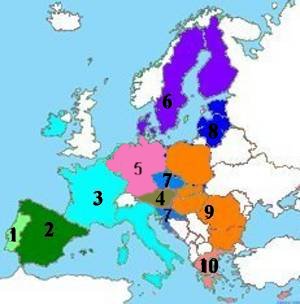History of the European Board of Medical Genetics Professional Branch Board for Clinical Laboratory Geneticists
An increasing need for recognition of also a laboratory speciality in clinical genetics was recognized by the ESHG in 2010/2011. Thus, the Ad hoc core committee: “laboratory genetics” was brought into being (Jacqueline Schoumans (chair), Egbert Bakker (co-chair), et al.). After establishing the EBMG in June 2012 (legal entity since June 2014) the “European Board of Medical Genetics division-CLG” was founded from the aforementioned subcommitee.
The EU has proposed to establish a professional qualifications directive scheme (link 1, link 2) which hopefully will be passed within 2016. To have a European registered Clinical Laboratory Geneticists (ErCLG) curriculum ready then, was the major work of this committee between 2011 and 2012 (Thomas Liehr (chair), Isabel M. Carreira (co-chair), et al.). A proposal for a core curriculum was established in 2012 and was slightly revised (actual version here). The core curriculum has been approved by the ESHG Executive Committee the Board. The curriculum has additionally received support from 14 country representatives, representing 204/345 (59%) of the EU weighted (qualified majority) votes.
The next task that our branch dealt with in 2012, was to contact 150 individuals in 44 countries. They were requested help aligning the requirements of the ErCLG core curriculum with those of their national guidelines of education. Information has been returned by colleagues from 41 countries. The results led to the dividing these countries into 3 different groups (link).
In 2014/2015 the application for the ErCLG title was opened for the first time. Only applicants from group 1 countries were eligible to apply. The overpowering response to this first call was that >250 individuals applied for the title (link). 247 applicants are holders of ErCLG since 2015; in 2016 we are already 293 and in 2017 almost 360.
In the call 2015/2016 applicants from all 3 groups, i.e. all European countries may apply for the ErCLG title. Also a possibility for recognition of practitioners / non-Medical Doctors working in Human Genetics diagnostics laboratories to be recognized as European registered Clinical Laboratory Geneticists (ErCLG) from countries outside of Europe was opened. In case of interest in this please contact Dr. Thomas Liehr Thomas.Liehr(at)med.uni-jena.de.
Overall, all our actions will hopefully be EU-recognized in future based on approved EU Directive 2005/36/EC - policy developments and Proposal for modernising the Professional Qualifications Directive = EU Directive 2013/55/EU. The latter was implemented on 16th January 2016.
Since 2016/2017 round we accept also applicants worldwide. Such applicants being eligible for the ErCLG title but not working in Europe can obtain the title 'affiliated ErCLG'.
Therefore we need 9 EU countries having accepted the national CLG-title by their national parliaments.
This is yet the case for Czech, Finland, France, Greece (see also here), Hungary, Italy, Latvia, Lithuania, Poland, Portugal, and Slovenia - besides there are in Europe also CLGs state recognized in non-EU-memberstates Northern-Macedonia, Switzerland and UK. Yet we are stuck, as national state recognized CLG titles must be registered country wise at the Regulated Professions Database (RPD).
In 2017 the EBMG-ErCLG group published a paper on the activities of the board and its goals (link).
In 2018 the head of the the EBMG-ErCLG group published some examples of questions asked in tests for ErCLG applicants from group 3 countries.
How committee members for ErCLG board are selected
In ErCLG Board there are 10 positions:
- Committee members can be only from EU member states
- There are 10 zones from which one person must be nominated (see list and figure below)
- Nominations can either by suggestions from present board, or also by spontaneous application to be considered by the board, or by request of the board to national contacts of countries from the corresponding zone.
List of EU countries and zones (from West to East – zones may be changed by present board at any time)
- Portugal
- Spain
- France, Italy, Ireland
- Austria
- Belgium, Germany, Netherlands
- Denmark, Finland, Sweden + outside of EU, but in Europe
- Croatia, Czech Republic, Slovenia
- Estonia, Latvia, Lithuania
- Slovakia, Poland, Bulgaria, Hungary, Romania
- Cyprus, Greece, Malta

